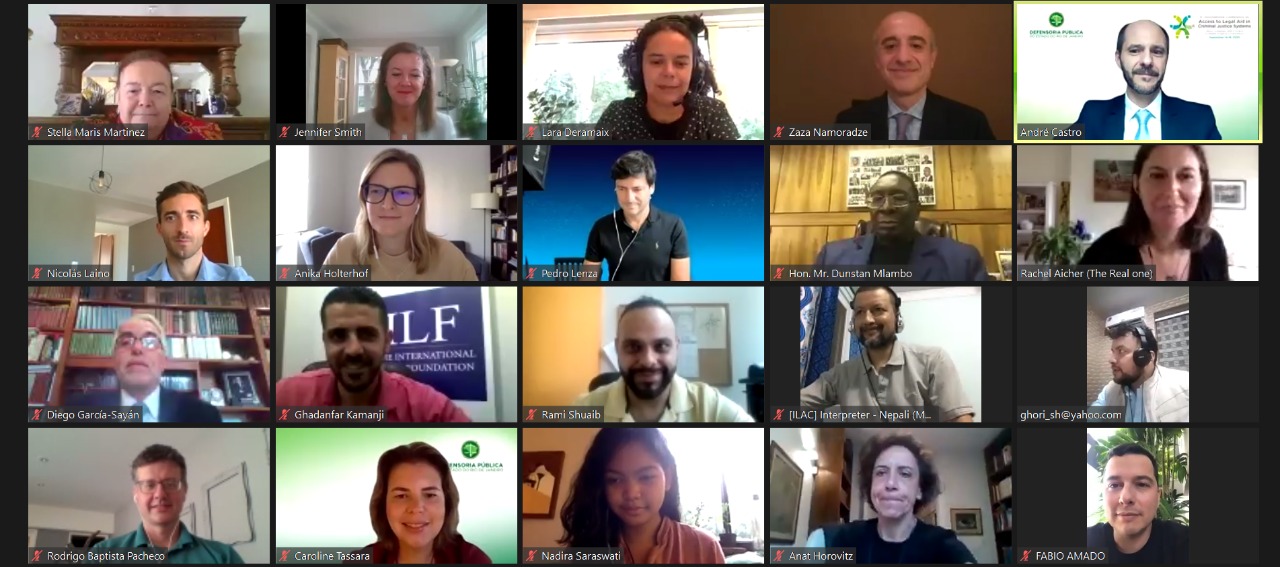ILAC comes to an end reaffirming commitment to fight injustices

Legal Aid Network (ILAN) to be made official in the near future
This Friday (18), at the closing session of the 4th International Conference on Legal Aid in Criminal Justice Systems, more than 800 participants from 89 countries met for the last time, online, to discuss outcomes and share the final document of the event. Deemed an absolute success, the conference sought to advance, within the context of COVID-19, in the implementation of the United Nations Principles and Guidelines on Access to Legal Aid in Criminal Justice Systems, thus promoting the 2030 Agenda on Sustainable Development and its object “to leave no one behind”.
On behalf of the Public Defender’s Office of Rio de Janeiro, Public Defender André Castro thanked everyone for their participation and acknowledged the pivotal cooperative work of the organizations that helped make the event possible (https://ilac2020.rj.def.br). “The lack of access to legal aid is directly related to the inadequate planning of our justice systems. Public resources are being used to prosecute and judge, instead of protecting vulnerable populations”, added Castro.
Zaza Namoradze, Director of the Open Society Justice Initiative, and Dunstan Mlambo, Judge President of the Gauteng Division of the High Court of South Africa, presented the outcome document. Jennifer Smith, Executive Director of The International Legal Foundation (ILF), and Stella Maris Martinez, Public Defender General of Argentina, spoke of the importance of working collectively.
Smith and Martinez commented on the challenges and opportunities brought by the pandemic, such as the possibility of an event like this, for being virtual, to reach a much larger and geographically dispersed audience. From now on, it is necessary to reinforce cooperation between public defenders and legal operators in a permanent way, reinforces Martinez. “We need to walk with solidarity, expertise and support from each other.” In this sense, the International Legal Aid Network (ILAN) should be made official in the near future.
In a powerful speech, Diego García-Sayán, UN Special Rapporteur on the Independence of Judges and Lawyers, pointed out that the organizations represented at the meeting are extremely important. After all, he said, “legal assistance is not a form of public charity; it has to do with the fundamental rights of oppressed people who, through these organizations, are able to maintain such rights”.
He says that defending the rule of law today is much more difficult, complex and challenging, since there has been an increase in poverty and exclusion in many parts of the world. Accordingly, he outlined a few priorities to be considered, such as making sure that judicial systems act independently, especially in face of vested interests of international organized crime and political power.
Sayán also addressed the need for immediate service rationalization in judicial systems, for example, by prioritizing important issues in fundamental cases over civil and economic ones. He also highlighted the abuse of authority and the need to remain vigilant so that the pandemic is not used as a justification for the violation of human rights.
Towards the end of his lecture, UN Special Rapporteur pointed out the importance of innovation and technological evolution to ensure the proper functioning of justice, which, in turn, requires financial resources and professional training. People deprived of liberty, who could have been released in the context of the pandemic, also deserve more attention, although many countries are doing very little in this regard. Remarks on the adequate funding for judicial systems and the fight against organized corruption at the transnational level concluded their participation.
VOLTAR






